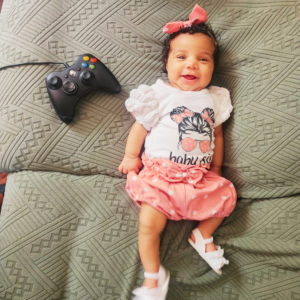There’s nothing quite like the sight of a baby’s smile. It’s a universal gesture that transcends cultures and languages, spreading joy and warmth to everyone it touches. But beyond its heartwarming effect, a baby’s smile holds significant benefits for both the infant and those around them. In this article, we’ll explore the science behind these smiles, delving into the physiological, psychological, and social advantages that come with each precious grin.
The Science Behind a Baby’s Smile
Babies begin to smile around six to eight weeks old, starting with reflexive smiles that eventually evolve into social smiles. This development is not just a charming milestone but also a crucial part of their neurological and emotional growth.
Neurological Development
Smiling is an indication of brain development. According to pediatric neurologists, the ability to smile involves the coordination of various parts of the brain, including the cortex, which is responsible for voluntary actions, and the limbic system, which manages emotions. This complex process showcases the intricate wiring of an infant’s brain and its progress in integrating sensory experiences with emotional responses.
Emotional Regulation
When babies smile, it activates the brain’s reward system, releasing endorphins and dopamine, often referred to as “feel-good” chemicals. These neurotransmitters help the baby manage stress and promote a sense of well-being. This early emotional regulation is vital for developing resilience and coping mechanisms later in life.
Benefits for the Baby
Strengthening Bonds
A baby’s smile is a powerful tool for bonding with caregivers. When a baby smiles, it triggers a reciprocal response from parents and caregivers, creating a positive feedback loop. This mutual exchange fosters secure attachment, essential for the child’s emotional and social development.
Encouraging Communication
Smiling is one of the first forms of communication that babies use. It is a non-verbal cue that indicates contentment, curiosity, and engagement. This early form of interaction encourages parents to respond, laying the foundation for more complex forms of communication as the baby grows.
Cognitive Development
Studies have shown that social interactions, including smiling, stimulate a baby’s cognitive development. Engaging with caregivers through smiles and other facial expressions helps babies learn about social cues and emotional expressions, which are critical for their social cognition and empathy skills.
Benefits for Parents and Caregivers
Emotional Well-being
The joy and satisfaction parents feel when their baby smiles can significantly enhance their emotional well-being. It acts as a form of positive reinforcement, boosting parental confidence and reducing stress. This emotional uplift can be particularly beneficial for new parents, who often face the challenges of sleepless nights and constant care.
Strengthening the Parental Bond
Smiling is a universal sign of love and acceptance. When parents see their baby smile, it strengthens their emotional bond and reinforces their commitment to their child’s well-being. This strong bond is crucial for providing a stable and nurturing environment for the baby’s growth.
Encouraging Positive Interactions
A baby’s smile can encourage more positive interactions within the family. It fosters a loving and joyful atmosphere, promoting harmonious relationships among family members. This positive environment is conducive to the overall mental health of the household.
Social Benefits
Building Community
Babies’ smiles have a remarkable ability to bring people together. Whether it’s in a family setting, a playgroup, or a public place, a baby’s smile can bridge social gaps and create a sense of community. It encourages social interactions and can even act as an icebreaker in unfamiliar settings.
Promoting Altruism
Research suggests that seeing a baby smile can increase feelings of empathy and altruism in others. This emotional response can lead to more supportive and cooperative behavior in social groups, enhancing social cohesion and mutual support.
Long-term Impact
Fostering Emotional Intelligence
The emotional interactions facilitated by a baby’s smile play a crucial role in developing emotional intelligence. Babies who experience positive and responsive interactions are more likely to develop empathy, self-awareness, and social skills. These attributes are essential for success in personal and professional relationships later in life.
Reducing Stress and Anxiety
The stress-relieving effects of a baby’s smile are not limited to the moment of interaction. Parents and caregivers who frequently engage in positive exchanges with their baby are likely to experience lower levels of chronic stress and anxiety. This can have a long-term positive impact on their mental and physical health.
Conclusion
A baby’s smile is much more than a simple facial expression. It is a profound gesture that signifies neurological growth, emotional regulation, and social connection. For babies, smiling strengthens bonds, encourages communication, and boosts cognitive development. For parents and caregivers, it enhances emotional well-being, strengthens the parental bond, and fosters positive family dynamics. On a broader scale, a baby’s smile can build community, promote altruism, and contribute to the development of emotional intelligence.
As we continue to uncover the science behind these delightful expressions, it’s clear that the power of a baby’s smile extends far beyond its immediate charm. It plays a pivotal role in nurturing a supportive, empathetic, and connected world. So, the next time you see a baby smile, remember that you’re witnessing a remarkable and transformative act that benefits everyone involved.



angelce903 July 12, 2024
I really enjoyed your article! I remembered the first smile of my nephew to me. I was so enticed! And I wondered if he was really smiling at me because in Cameroon, some people say that before six weeks, a baby’s smile is just automatic. But honestly, I noticed that at just one week, he wanted to establish a connection with me. And I was deeply honored. Thanks for reminding us all the benefits that a baby’s smile can bring at every level. This is huge!
Marlinda Davis August 27, 2024
Hey Angel,
Thank you so much for sharing your beautiful memory! That first smile from your nephew sounds like such a special moment.
It’s amazing how even at such a young age, babies have the ability to create a deep, meaningful connection with us through something as simple as a smile.
In many cultures, there are different beliefs about when a baby’s smile becomes truly intentional, but your experience shows just how powerful and genuine those early interactions can feel. It’s wonderful that you felt that connection with your nephew so early on—it’s those moments that stay with us forever.
I’m glad the article resonated with you and reminded you of the incredible impact a baby’s smile can have.
Thank you for your kind words, and for taking the time to share your story. It truly means a lot!
Linden Thorp July 12, 2024
This is an inspiring article. I never realised there was so much physiology and chemistry behind a smile. Though I certainly know the power smiles have on other people.
I have taught foreigners to communicate in an authentic way in English for several years, and I try all sorts of ploys to get them to smile when they’re speaking in public. But it’s difficult because they’re so tense. Any tips?
I’m a lifelong Buddhist, and the Buddha advocated smiling. He is usually depicted as smiling. There is great spiritual significance in a smile, too.
Marlinda Davis August 27, 2024
Hey Linden, thank you so much for your thoughtful comment! It’s wonderful to hear that you found the article inspiring. Smiles indeed hold such fascinating power, not just in a physiological sense but also in how they connect us on a deeper, more spiritual level.
Your work teaching authentic communication sounds incredibly impactful, especially since a smile can be such a powerful tool in breaking down barriers. When it comes to encouraging your students to smile while speaking in public, perhaps incorporating relaxation techniques could help ease their tension.
Gentle breathing exercises or even a brief moment of mindfulness before speaking might help them feel more grounded and naturally inclined to smile. It could also be helpful to create a light, supportive environment where they feel comfortable enough to let their authentic selves shine.
Your mention of the Buddha and the spiritual significance of a smile really resonates. A smile, after all, is a universal language that transcends words and connects us on a soul level. It’s amazing how something so simple can carry such profound meaning.
Thank you again for sharing your insights, and I wish you continued success in your teaching journey!
Eric July 12, 2024
Hi Marlinda,
Smiles are contagious. But a baby’s smile? That’s a superpower.
You’ve uncovered a truth that’s both simple and profound: those tiny grins are changing the world, one neuron at a time.
Think about it. In a world of complexity, a baby’s smile is the ultimate disruptor.
It cuts through our adult pretenses, our digital distractions, and our carefully constructed walls. It’s the original viral content, spreading joy without likes or shares.
But here’s the kicker: it’s not just feel-good fluff. It’s biology, psychology, and sociology all wrapped up in a toothless grin. It’s nature’s way of ensuring we connect, grow, and thrive.
What if we treated every interaction like a baby’s smile? What if we approached our work, our relationships, and our challenges with that same power to light up neural pathways and build bridges?
The next time you see a baby smile, remember: that you’re not just witnessing cuteness. You’re seeing a masterclass in human connection, emotional intelligence, and community building.
In a world that often feels divided, maybe what we need isn’t more sophisticated technology or complex solutions. Maybe we just need to smile more, like we did when we were babies.
Because in the end, that’s how we change the world. One smile at a time.
Keep spreading the joy,
Eric
Marlinda Davis August 26, 2024
Hey Eric,
I’m glad you enjoyed this info and article. Babies do have a special, charming effect on us.
I hope you continue to checkout our channelMokenchiTVfor continued baby smiles to brighten your day & life in general.
>Click Here To View MokenchiTV on YouTube